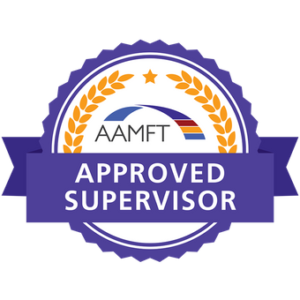Clinical Supervision
Are you feeling overwhelmed with your case load and question at times if you are making a difference? Are you looking for support to help with your development as a growing professional to include developing your practice, and helping identify and address self-of-the-therapist issues related to your clinical work? Are you needing clinical supervision as part of your training and meeting the requirements for LMFT or LPC licensure? Are you needing help in your development of professional competencies? Are you looking for help with knowledge gaps, about theories, models and their practical applications to the work with your clients? Are you wanting help applying and refining clinical skills with couples and families?
If you answered “yes” to any of the above I would like to provide a safe and supportive environment in which reflective practice and learning can take place.
 About Me
About Me
I am licensed in Wisconsin as both a Licensed Marriage and Family Therapist (LMFT) and Licensed Professional Counselor (LPC). I have trained extensively in couples and family clinical supervision in both Great Britain and the United States: I am an Approved Supervisor with the Association of Family Therapy U.K., and the American Association of Family Therapy. Since 2014 I have been teaching couples and family therapy and supervise students training to be Licensed Marriage and Family Therapists at the Family Therapy Training Institute in Milwaukee.
Individual and Virtual Group Supervision
Supervision/Consultation is available on an individual or peer group basis.
- In the context of a supportive, collaborative alliance, I provide direct, case-specific encouragement and suggestions for how to intervene more effectively. Supervision can be enhanced when reviewing clips of video of the therapist working with the client. The therapist is responsible for obtaining written consent to show the video in consultation.
Individual supervision can be in person or via secure videoconferencing. The cost of individual supervision for 40 minute session is $85, and for the full hour it is $125. - Virtual Group Supervision (Videoconferencing)
Videoconferencing supervision groups meet on a regular basis to help with stuck cases and for participants to further their understanding of themselves as clinicians, and of the clients whom they serve. Group consultation can be beneficial in many ways:- Meeting on a consistent basis with your peers provides safety and support and shared learning.
- Group becomes a valuable resource for feedback and provide new ideas.
- Group members receive consultation regarding their own clients, making the group supervision immediately practical and applicable to their work
- Groups use a variety of approaches to learning:
- discussions about the theory and practice
- viewing video clips of participants’ actual client sessions and/or training videos
- role play with coaching
- Monthly Option
This option is offered three times a year: September-December, January-April, and May-August and meets once a month for 90 minutes. The maximum number of members will be four. Commitment to all four sessions is expected. The rate for each of the four 90-minute sessions is $55.
My Approach to Clinical Supervision
The theoretical foundation of my supervision approach is experiential learning with an emphasis on developing and maintaining collaborative and trusting relationship to help supervisees reach their supervisory goals.
My approach is strength based which aims to facilitate a reflective conversation that draws upon supervisees’ expertise, knowledge, strengths, past successes, resources and creative ideas with the intent to leave supervisees feeling more in control, competent, and successful.
At times my approach will take on:
- a coaching rolewhen supervisee want help applying and refining clinical skills.
- a mentoring role when the focus is on the supervisees’ personal development as a growing professional, to include helping identify and address self-of-the-therapist issues related to clinical work.
- a teaching rolewhen the supervisee has knowledge gaps about theories, models, and interventions at a general broad level.
- anadministrative role to clarify what the supervisee must do to ensure client safety, quality of care, compliance with the organization policies, ensure adequate focus on the development of professional competencies and ethical decision-making.
Diversity and Inclusion
My approach to supervision includes establishing a safe space to discuss diversity and the complexity created by the various intersections of social location dimensions (Social GRRAACCCEESS: Gender, Race, Religion, Age, Ability, Class, Culture, Ethnicity, Education, Sexuality, Spirituality) between each other and the clients. Such discussions will be aimed to help identify what you need to deliberately work on to develop in your posture of cultural humility, curiosity, grow in your sensitivity to issues of diversity, culture, oppression, marginalization, power and privilege, and maintain an awareness of our unconscious prejudices so that such biases do not get in the way of developing a therapeutic relationships.
Deliberate Practice
One aspect of supervision will be facilitating professional growth and deliberate practice which will include establishing an ongoing learning and development plan optimizing the use of feedback.
Stretch Goals
Stretch goals help the supervisee stretch out of their comfort zone into the learning zone to improve on a specific area for performance. Stretch goals are specific to the clinical population that the supervisee works with and come from exploring common difficulties of less successful cases, common factor domains (i.e., structure, hope & expectancy, working alliance, client factors & therapist factors) and/or a specific growth and development areas within your professional competencies.
Routine Monitoring and Feedback
It is vital for supervisees to receive ongoing client feedback by using routine outcome monitoring (ROM) practices.
In addition, it is beneficial for supervisees to record their sessions, so that they can receive specific feedback about their performance.
Self-of-the Therapist
My supervision approach will also help prepare you to make active and purposeful use of who you are, personally and professionally, and being skilled at using your whole self in your encounters with clients. In supervision you will be invited to reflect on how to make conscious and planned use of your race, gender culture, values, life experience, and in particular, personal vulnerabilities and struggles in how you relate and work with clients.
In addition, you will be encouraged to identify and explore your Person of the Therapist Themes which are the personal issue(s) or hang-up(s) of yours that continue to vex you, affecting many areas of your life including your relationship with clients. Supervision will help you consciously and purposefully work through your humanity to relate, assess, and intervene therapeutically.
Contact Me
Please contact me if you have any questions or would like to discuss what supervision options would be best for you.

